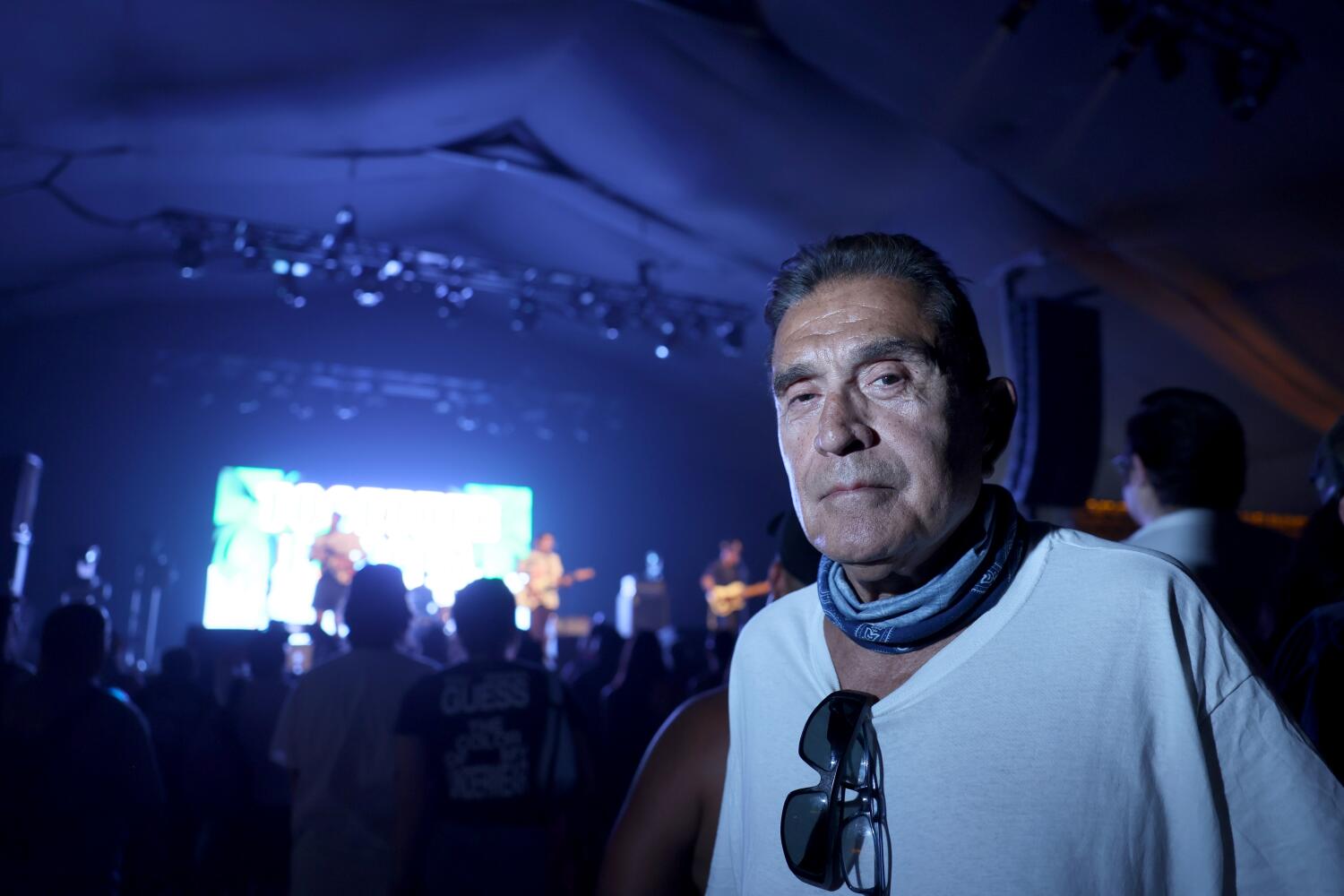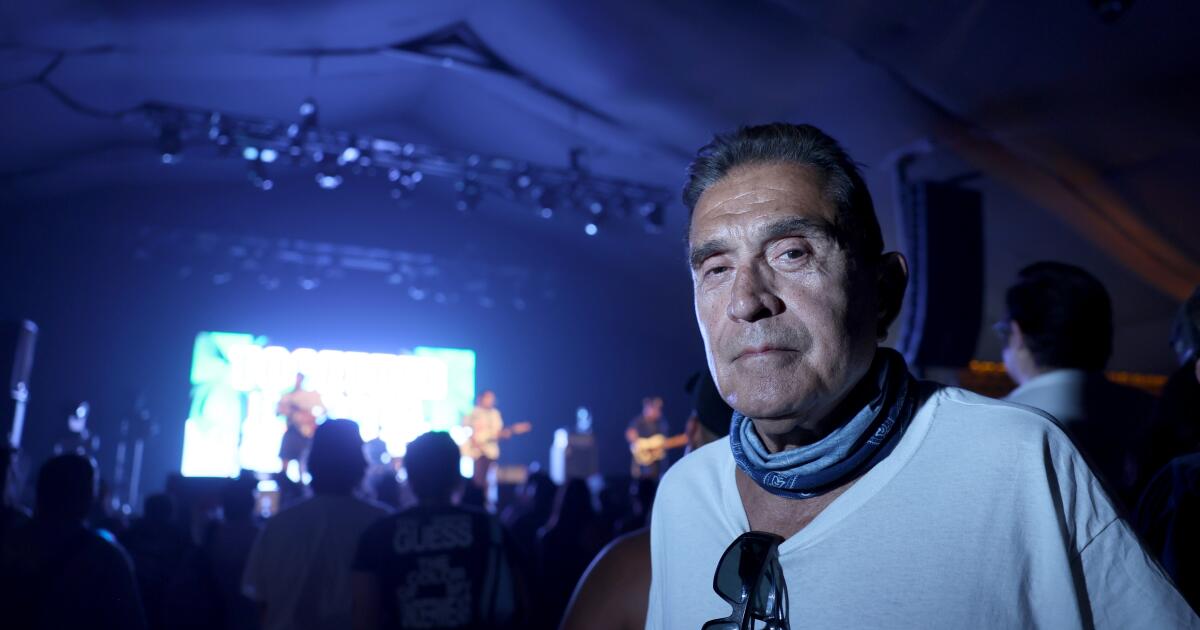
Inside the club-like Sonora tent on the grounds of the Coachella Music and Arts Festival in Indio, Gary Tovar is inching closer to the stage. As ever, he’s snapping pictures on his phone, and shooting bits of video, to be shared online later.
Onstage on this opening weekend of the festival is the Los Angeles indie rock act Together Pangea, but for some astute music-lovers in the crowd, Tovar is as recognizable as anyone who will be on this stage. He’s the founder of Goldenvoice Productions, which launched Coachella in 1999, and was a crucial supporter of L.A.’s original punk rock concert scene in the 1980s.
Dressed in his usual plain white T-shirt, dark khaki shorts, with a blue bandana tied close to his throat, Tovar can barely get a few steps across the air-conditioned room before he’s greeted by another admirer. While Tovar no longer owns the company he founded in 1981, he remains its No. 1 fan, attending multiple concerts and club shows every week, sometimes two or three a night.
At Coachella, he is an especially active consumer of music, starting his day with breakfast in catering, and spending a full day going from stage to stage. He often travels in his own golf cart, but says he still gets 25,000 steps in a day. The heat, reaching above 100 degrees on opening weekend, does not slow him down.
“A lot of people stay in their era,” Tovar says of his ongoing music consumption. “There’s a lot of people complaining — they came here in 2009 — they still want MGMT, they want Yeah Yeah Yeahs, and they want time to stop. You have to be eternal. I don’t mean you’re gonna live forever. I mean, when the music moves, you move with it. You can’t pine for yesterday.”
That said, he maintains a lot of affection for the punk era that launched Goldenvoice in the early 1980s. While other local punk rock promoters came and went, Goldenvoice became an essential champion of punk, metal, goth, industrial and other revolutionary sounds of the time. Tovar also flew in acts from overseas for their first L.A. area shows.
Tovar saw himself as a patron of the arts, putting the likes of Black Flag, the Dead Kennedys, Siouxsie and the Banshees and Jane’s Addiction onstage at the Olympic Auditorium, Santa Monica Civic, John Anson Ford Amphitheatre and Fender’s Ballroom.
He survived where many others failed because he had the resources to follow his musical passions, even if the shows weren’t always profitable. The reason: Tovar was a marijuana smuggler, bringing contraband in from Colombia and then Thailand. He made millions, until a prison sentence took him away for seven years, and he handed the company over to his successors: Paul Tollett and the late Rick Van Santen.
While Coachella emerged during his time in prison for marijuana trafficking, the world-renowned festival is a lasting legacy of his nascent shows of the 1980s.
“This wouldn’t be here if it wasn’t for Gary,” says Circle Jerks singer Keith Morris, sitting in the band’s Coachella dressing room right after the band’s set. “It was more about him being a fan than it was about the business. He’s a total music freak.”
He was also a rock fan going back to the 1960s, as a teenager once seeing Jimi Hendrix perform in Maui. Tovar got his first taste of punk rock at the final Sex Pistols performance at San Francisco’s Winterland Ballroom in January 1978. While intrigued, Tovar didn’t imagine a place for himself in that world until his sister, an early fan of punk, mentioned that bands from the then-controversial genre were having trouble finding gigs to play.
Beginning with a TSOL show in Santa Barbara on Dec. 4, 1981, Tovar dove in, eventually focusing on Los Angeles.
He named the company after a favorite strain of Thai marijuana. “They said when you smoked it, it was like the angels sang to you in a golden voice,” Tovar recalls with a smile.
For a logo, he turned to Black Flag bassist and SST Records co-founder Chuck Dukowski, who spelled out the Goldenvoice name in “Chinese”-style lettering left over from the cover art for the Minutemen’s “Paranoid Time” EP. (That same font is now used in the Coachella logo.)
By 1983, things took off quickly for Goldenvoice, but soon went off the rails with a riot at a TSOL and Social Distortion concert at the original SIR Studios on Sunset Boulevard. There was another riot at an Exploited show in Huntington Park. Tovar had another concert lined up for Wilmington headlined by the aggressively radical Dead Kennedys that he was calling “Storming the Docks,” if he could get police to sign off. Tovar met with the San Pedro Police, and he was asked, “What type of band is the Dead Kennedys?” Tovar says he looked up and saw an official portrait of President Reagan on the wall. “My mind clicked in. I said, ‘The Dead Kennedys are a tribute band to John and Robert Kennedy. Where do we sign?’”
That show also ended as a riot. “Oh, they got so mad,” Tovar says now. “I had to go in there with a little trickery, man.”
After his third consecutive riot, Tovar turned to the Olympic Auditorium, the impenetrable concrete bunker in downtown Los Angeles where he’d hosted Black Flag a year before. The venue, with a 5,000-person capacity just on the ground floor, was large enough to absorb any number of punks and others who wanted to attend, without leaving anyone outside to loiter or get in trouble.
Tovar fully expected that initial wave of punk rock euphoria to fade within a couple of years, and it did. “Punk rock is like a shooting star. I knew it wasn’t going to last,” he says. “At the end of ‘85, it was showing cracks. Too much violence. Girls didn’t want to come.”
After two years at the Olympic, and as punk crowds began to diminish, he moved many of his shows to the smaller Fender’s in Long Beach, expanding to other venues in Southern California as needed.
As a leading proselytizer of punk and other alternative sounds, Tovar often partnered with promoters in other cities. It rarely meant a windfall for him. At one concert in Sacramento with the Ramones, he barely broke even. “I found a $20 bill in the parking lot,” he remembers. “That was my profit.”
His money was largely made elsewhere. “One of my hands was in punk rock, championing underground music that was on the fringe,” he says. “And my other hand was smuggling quality marijuana. We went for the quality.”
If anything, the pot business was accelerating. His role was to sail the marijuana from Colombia and Thailand to the U.S. When the drug trade in Colombia shifted away from marijuana to cocaine, Tovar turned toward Thailand.
“I did not believe in cocaine because marijuana is done with a handshake, and cocaine is done with a gun. I’m not a violent person,” Tovar recalls. “All the smuggling I did was done with diversionary tactics. I’ve still never shot a gun. I’m trying to go all the way.”
When one of his associates was arrested, Tovar knew it was only a matter of time before federal drug agents came to him. It turned out to be years, giving Tovar time to train his proteges Tollett and Van Santen. On March 8, 1991, the feds arrived at his home and arrested him, and he remained in custody until after his trial and the end of his sentence.
Ironically, by the end of 1991, music had shifted in his direction. “Eight months after I went in, Nirvana, Pearl Jam and Chili Peppers broke,” he says. “I remember being in prison and saying, ‘Wow, I almost made it.’ It took a long time for enough people to come around.”
He shows no bitterness about spending years in prison for selling something that is now widely and openly available across the state. While in prison in Nevada, he heard about the new festival Goldenvoice was going to host in the desert. Once he returned, he hasn’t missed a single edition of Coachella.
Tovar is now a consultant to Goldenvoice. (The company was eventually sold to AEG in 2001.) He was especially active in last year’s No Values festival, which celebrated generations of punk rock, with the Misfits, Social Distortion, Iggy Pop and dozens more. As an extremely active concertgoer, he has a more informed opinion than most.
Backstage before the Circle Jerks set on Coachella’s opening weekend, a lot of old friends and admirers greet Tovar warmly. Among them is booking agent Andy Somers, who frequently had bands playing Goldenvoice shows in the ‘80s, with a roster that included the Circle Jerks, GBH, Megadeth, the Exploited and Testament.
Somers still has fond memories of Goldenvoice during that early chaotic period. “It was so DIY and so disorganized, with heart in the right place,” Somers says. “That’s what made it work.”
As he gets into a conversation with Tovar, the Goldenvoice founder reminds him that just securing a venue could be difficult at a time when punk was seen by many as the latest threat to society.
“We had to try to look for places to put these bands on,” Tovar says to Somers. “The Circle Jerks had a rowdy crowd. I mean, not anything abnormal. But punk rock back then, it had its exuberance.”
Somers smiles in agreement, and adds, “It was shocking. It scared the mainstream a little bit. You see a mosh pit and you watch it and go, ‘Is that supposed to be fun?’”
Also backstage is Rene Contreras, who books the Sonora stage (which was named by Tovar) and came into the Goldenvoice fold as a next-generation promoter who grew up a SoCal music fanatic. He was in his early 20s when he first met Tovar about 15 years ago, and knew him mainly as another fan he saw at shows everywhere.
“When I didn’t have a car, he used to give me rides to shows,” Contreras says. “It took me a while to unravel his history and legacy that he had in music. He’s out every night. He’ll call me at least three times a week and we talk about shows that are happening, or sometimes he even fills me in: ‘Have you heard of this band?’”

